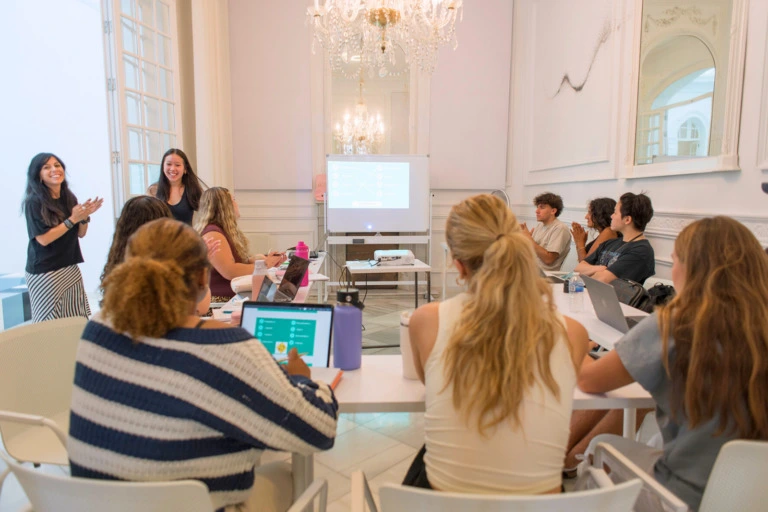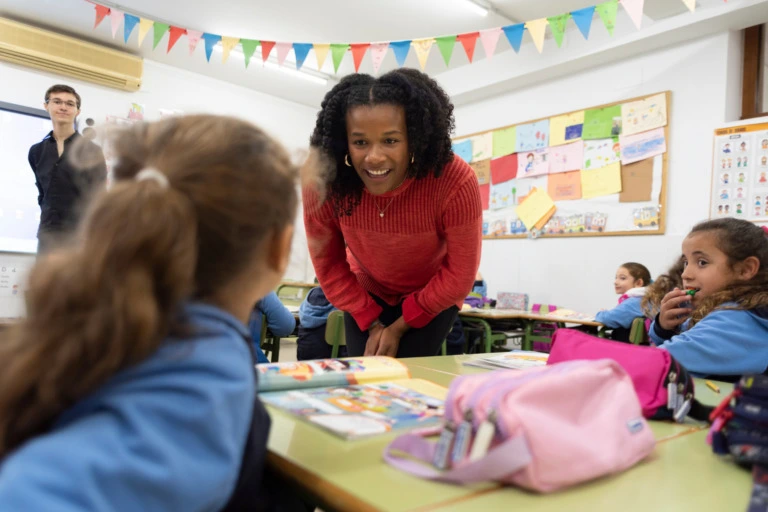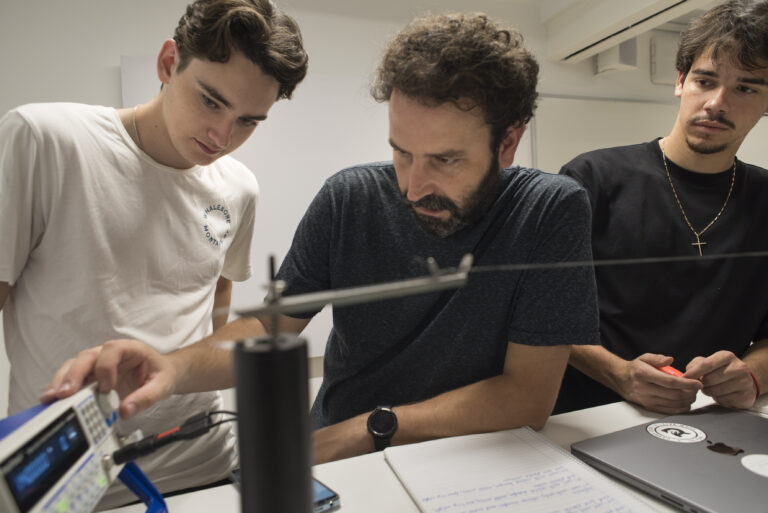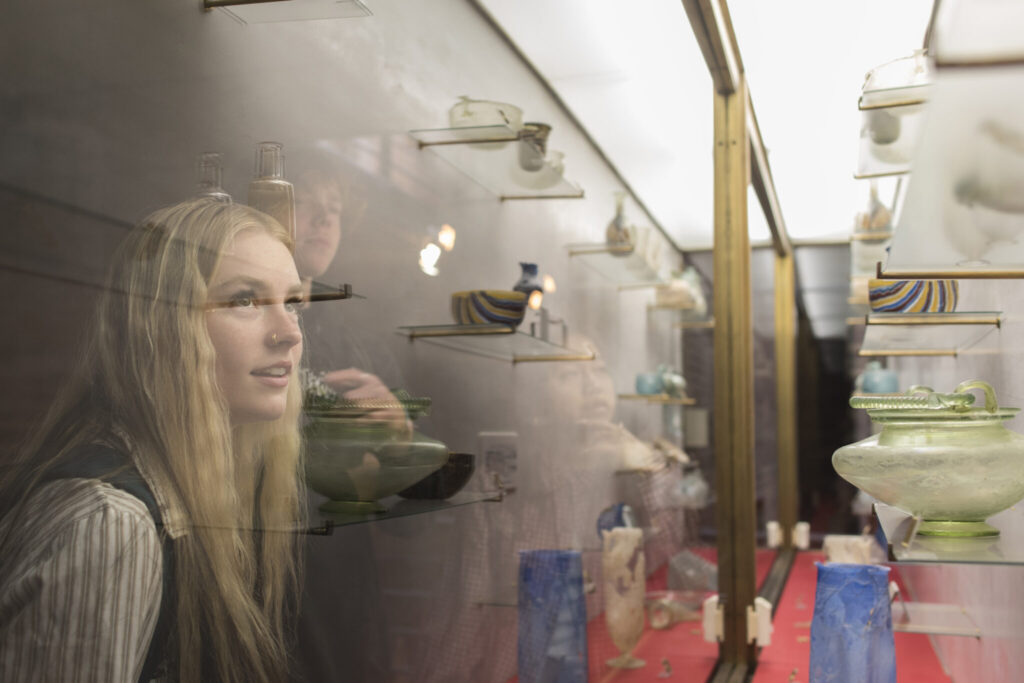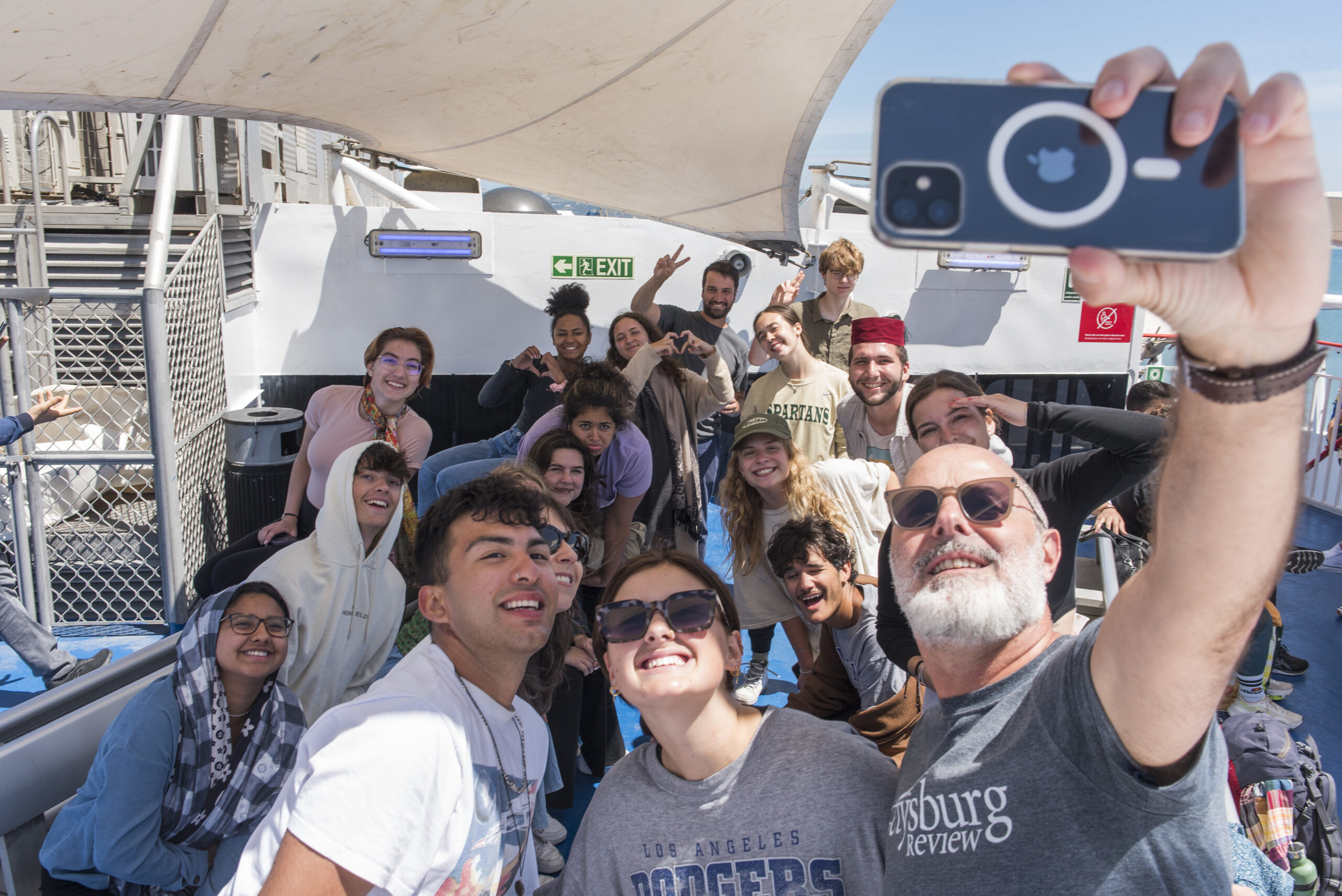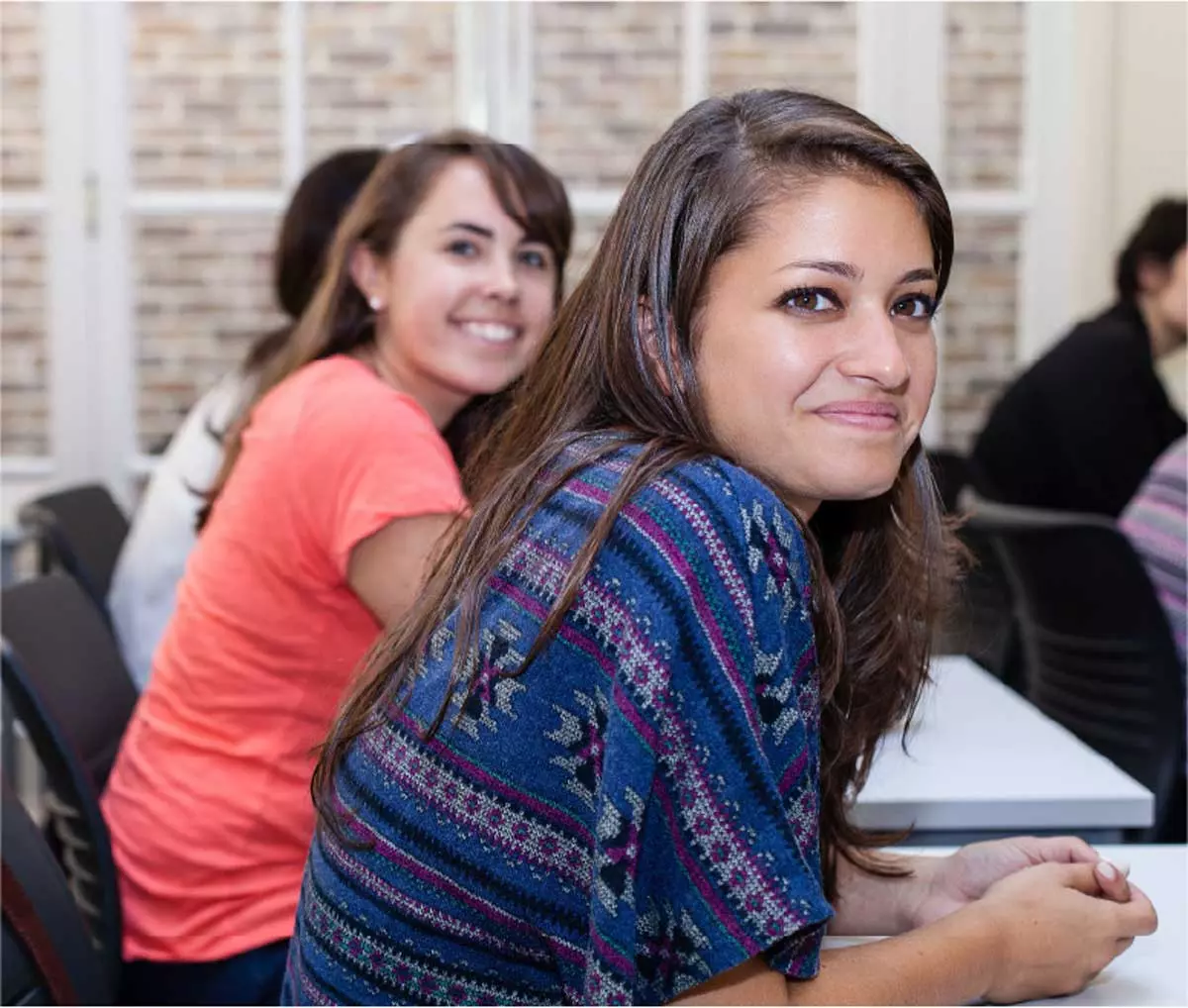
STUDY ABROAD IN
SEVILLE,
SPAIN
CHANGE YOUR WORLDVIEW in Seville, Spain
Study abroad in Spain and immerse yourself in Seville’s vibrant energy. From its welcoming people, exciting foodie scene, iconic art, sunny weather, and lively traditions — you’ll find it all.
Dates & Deadlines
- Fall ’26: Aug. 24 – Dec. 5 (Enroll by 6/1/26)
- Spring ’27: Mid Feb. – late May
Requirements
- Fall Semester Abroad: Must be 18 by June 1
- Valid Passport
- Country-specific Visa (additional cost)
Program Cost
- Fall ’26+: $22,500* before study abroad scholarships or grants
*A $2,500 administrative fee applies for non-U.S. citizens/non-U.S. permanent residents.
College Credits
- 12-17 Credits from our Academic Provider, the University of New Haven
Accommodations
- Homestays or Student Residence
WHAT WILL MY LIFE LOOK LIKE in Seville
Get engaged with the local community by volunteering as an English-language assistant in K-12 schools. Or, brighten someone’s day by volunteering in a nursing home and connecting with the elderly while building your Spanish language skills. In your free time, explore the stunning region of southern Spain or catch rays at the beautiful beaches nearby for an unforgettable adventure.
Getting around Seville: Enjoy the highly walkable city or use the convenient city buses, tram, Sevici bike rentals, and affordable taxis. Participants receive full support to explore Seville independently and can join various extracurricular activities and day trips organized by Verto.
Excursions & Activities
Possible Spain Study Abroad Excursions:
Day Trips: Explore historic locations like Córdoba, Cádiz, or Mérida.
Overnight Trip: Enjoy an overnight adventure to Morocco and stay with a host family.
Cultural Experiences: Visit important monuments like the Cathedral and the Royal Palace.
Additional Activities: Participate in hiking excursions to Aracena or Sierra Norte, or enjoy kayaking, yoga, workshops on photography, Flamenco, and journaling.
Excursions are subject to change based on availability each semester, ensuring a dynamic and enriching experience.
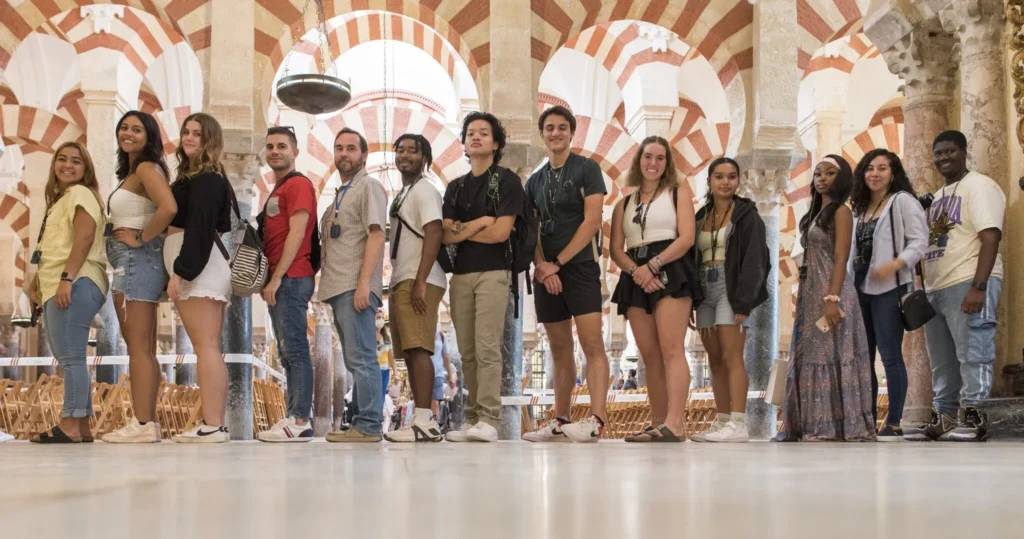
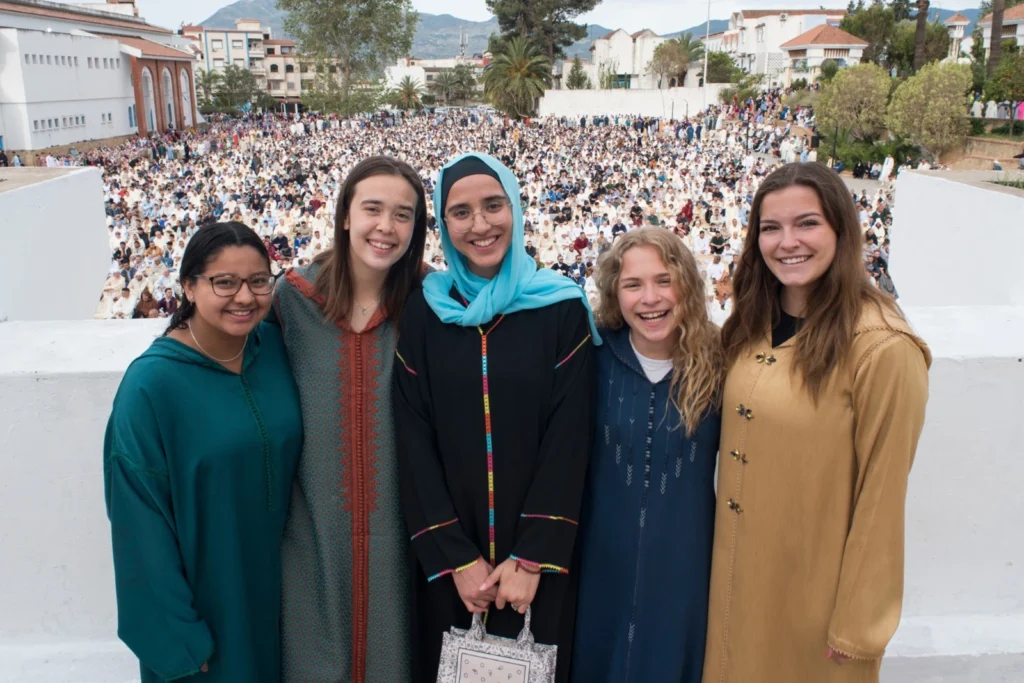
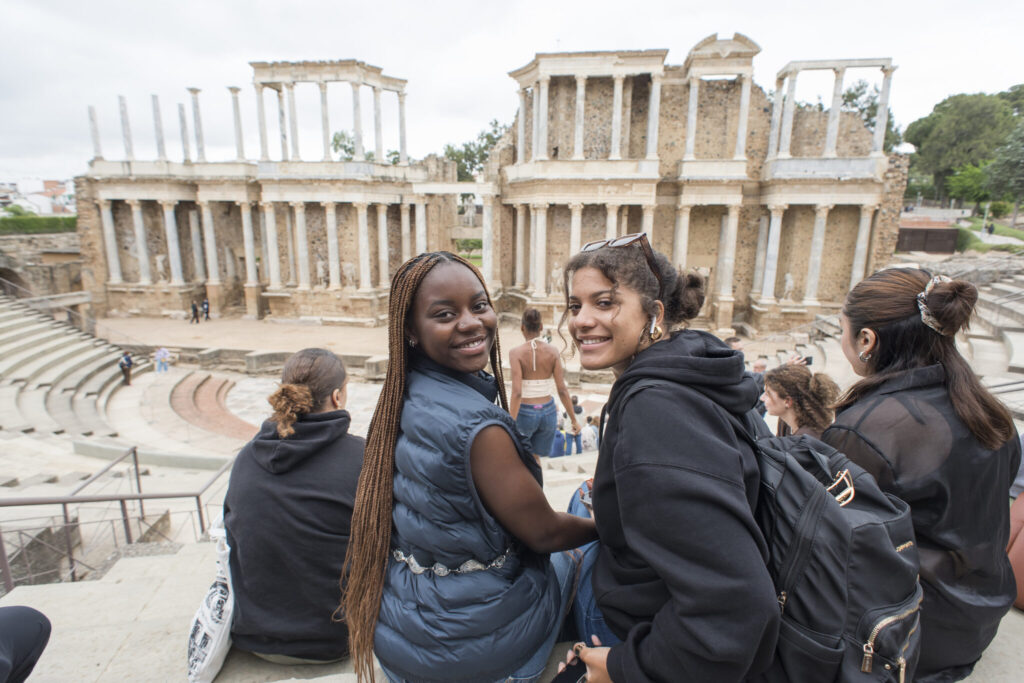
Accommodations
& Meals
Choose Your Home in Seville, Spain
Students can either enjoy the community of a residence or the authentic experience of a local homestay.
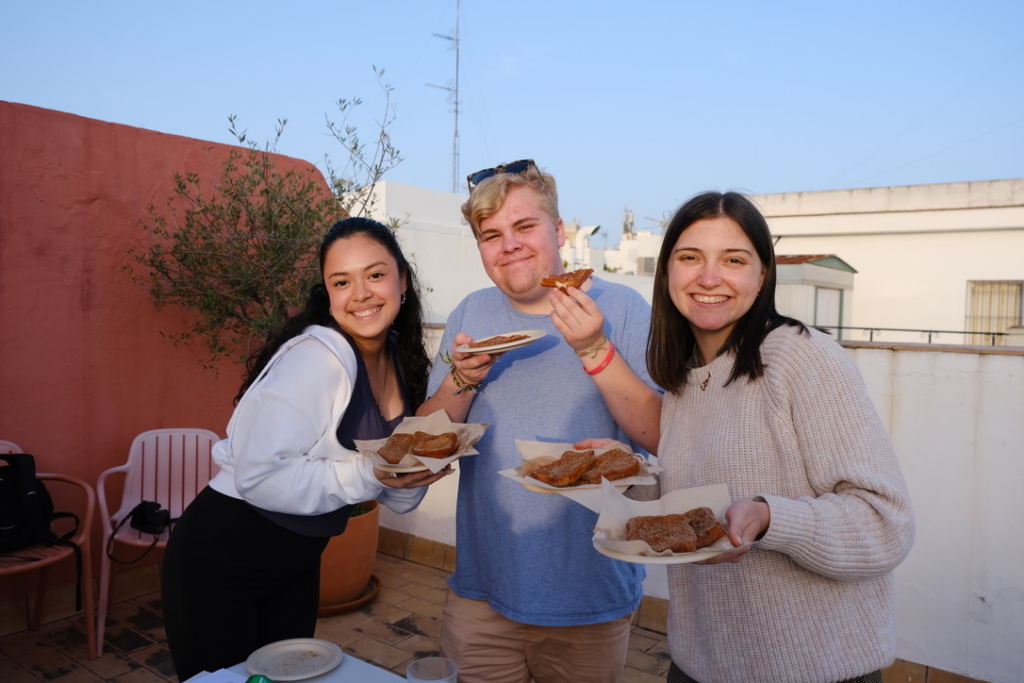
Verto Seville Study Center
After a delicious breakfast in your homestay or residence hall, you’ll love taking in the sights and sounds of the city as you commute to the study center. Situated in the heart of Seville, you can easily walk to major tourist attractions like La Giralda, Plaza de España, and the bustling local markets. The central location means you’re always close to the action, whether it’s a cultural festival, a historic site, or a trendy café.
ACADEMICS in Seville
As you study abroad in Spain, you’ll earn transferable college credits from Verto’s Academic Provider, the University of New Haven.
Verto’s Unique Academic Experience:
Small Class Sizes with Caring Professors: Enjoy personalized attention and engaging learning environments with an average classroom size of 16.
Excursions and Hands-On Learning Opportunities: Step outside of the classroom as you experience the culture and history of Seville through immersive activities.
Academic Support & Advising: Receive customized support to strengthen your academic skills, access resources like study groups and tutoring, and get 1:1 guidance on your journey to achieving your goals.

Seville Academic Spotlight: Science, Technology & Cultural Studies
Creative Writing, Spanish (6 levels), Public Speaking, Media & Technology, Computer Science, Physics, Math, Chemistry, Biology
SEVILLE Course Spotlight
*All classes at Verto locations are delivered by our accredited Academic Provider, the University of New Haven.
Course Information
Advanced Spanish
This course is intended to develop students’ proficiencies in speaking, writing, listening, and reading so that they can be at a level necessary for advanced literature and culture courses. It will emphasize composition and oral discussion as well as concepts necessary for a sophisticated appraisal of literature and culture in the target language. This course will be conducted in the target language.
Biology I: Molecular Basis of Life w/ Lab
Part of a year-long foundation course for science majors. The course explores the principles of biological organization with an emphasis on cell structure and function. Topics covered include molecular cellular organization and function, gene expression, cellular division, genetic inheritance, and processes involved in the synthesis and metabolism of carbohydrates.
Calculus I
The first year college course for majors in mathematics, science and engineering; and the basic prerequisite for all advanced mathematics. Introduces differential and integral calculus for functions of one variable, including algebraic and transcendental functions and culminates in the fundamental theorem of calculus. Includes basic rules and properties of limits and derivatives and applications of derivatives. Studies the plane analytic geometry needed for calculus.
Calculus II
Continuation of first year calculus, including the fundamental theorem of calculus, methods of integration, applications of the integral, improper integrals, infinite series, and introduction to differential equations.
College Algebra
A review of the fundamental operations and an extensive study of functions, exponents, radicals, linear and quadratic equations. Additional topics include ratio, proportion, variation, progression and the binomial theorem. This course is intended primarily for students whose program of study requires calculus or business math.
Contemporary Social Problems
The major problems which confront the present social order, and the methods now in practice or being considered for dealing with these problems.
Cultural Anthropology
A systematic study of the culture of preliterate and modern societies and of cultural change. Includes analyses of religion, economics, language, social and political organization and urbanization.
Elementary Spanish I
Focuses on the fundamental principles of grammar. Extensive vocabulary and pronunciation exercises.
Elementary Spanish II
Focuses on the fundamental principles of grammar. Extensive vocabulary and pronunciation exercises. Aural comprehension and pronunciation are tested by oral examination.
Foundations for Success
Foundations for Success is a unique one-credit course designed with the purpose of guiding students through the transition between high-school and college life. With a focus on developing essential skills that are integral for success both in and beyond the classroom, this course will equip first-year students with the tools necessary to thrive academically, socially, and personally. Our holistic approach recognizes the importance of intellectual, emotional, social, ethical, and physical development, making this course a powerful tool for growth and self-awareness. Through interactive coursework, students will learn how to cultivate lifelong learning skills, foster community, build resilience, and achieve personal success at every level.
General Chemistry I w/ Lab
This course discusses atomic and molecular structure, chemical bonding, stoichiometry, states of matter, and thermo-chemistry. This course includes a lab that introduces basic laboratory techniques and emphasizes data collection and analysis.
General Physics I w/ Lab
Primarily for life science majors with no calculus background. Basic concepts of classical physics: fundamental laws of mechanics, heat, electromagnetism, optics, and conservation principles. Introduction to modern physics: relativity and quantum theory; atomic, nuclear, and solid-state physics. Application of the physical principles to life sciences.
History of Art II
This course introduces students to works of art from the Renaissance period to the mid-20th century. The course explores the expressive, social, cultural, political, economic, and technological aspects of societies as reflected in their art.
Intermediate Spanish I
Stresses the reading comprehension of modern prose texts and a review of grammar necessary for this reading. Students are encouraged to read in their own areas of interest.
Intermediate Spanish II
Stresses the reading comprehension of modern prose texts and a review of grammar necessary for this reading. Students are encouraged to read in their own areas of interest.
International Relations
Forces and structures operating in the modern nation-state system, the foreign policy process, decision-making process, the impact of decolonization on traditional interstate behavior, economic and political developments since World War II.
Introduction to Business and Entrepreneurship
This course provides a framework for students to understand the decision-making processes, and related strategies, followed by an entrepreneur or business start-up. The course will introduce students to business fundamentals while they synthesize information from multiple sources to solve a business problem or opportunity. Students will use elements of design thinking and work in teams to design a business plan. Students will concurrently learn the language of business, while they build business communication skills.
Introduction to Music
Basic forms and styles of music in the Western World; music appreciation.
Introduction to Psychology
This course will provide students with a basic understanding of psychology as a science. It will introduce students to research methods, principles of learning, development, biological bases of behavior, psychological disorders, and social psychological phenomena. Additional topics may include cognition, sensation and perception, sleep, intelligence, and personality. Ethical issues within the field will also be examined.
Mechanics, Heat, and Waves w/ Lab
A first semester, calculus-based physics course for physical science and engineering majors. Fundamentals of mechanics and thermal physics. Vectors, kinematics, Newton’s laws, conservation principles for energy, momentum, and angular momentum, linear, rotational, and harmonic motion, superposition principle, gravitation, fluids, mechanical waves, sound, heat, ideal gases, laws of thermodynamics.
Modern Societies and Civilizations
In this course students will explore selected societies and civilizations from the sixteenth through twentieth centuries. This will include major cultural trends, interactions between society and economy, and analysis of cooperation and competition within and between various communities.Students will develop an understanding and appreciation of various cultures that shaped modern societies as parts of our shared human story. Examination of what it has meant to be human in diverse circumstances will provide students with powerful tools for better engaging their world today, and planning for our future. Amongst an array of methods for historical analysis, students will receive training in various methods of computer-based data analysis, visualizations, and professional presentation - transferrable to any profession.
Philosophy of Religion
An examination of some philosophical notions used in religious discourse, such as meaning, truth, faith, being, God, the holy.
Pre-Calculus
Topics include: polynomials; algebraic functions; plane analytic trigonometry; and properties of exponential, logarithmic, and trigonometric functions. This course offers the foundation needed for the study of calculus.
Principles of Communication
This course will cover competencies and skills necessary to effectively communicate in various settings. Specifically, the present course will address the role of verbal communication, nonverbal communication, identity, culture, and listening in multiple communicative contexts. Students will have the chance to structure, organize, develop, and present information in multiple settings. These communicative contexts include interviews, group discussions, conflict situations, and social media.
Public Speaking and Group Discussion
Development of proficiency in organizing and presenting material in speaking, group interaction, conference management, and small-group discussion.
Quantitative Reasoning
Topics include: sets; basic logic; enumeration and elementary probability; mathematical applications of personal finance; and basic statistics.
Seminar in Academic Inquiry and Writing
This course introduces students to the conventions of academic writing and the habits of critical inquiry they will need in university courses and beyond. Students read and annotate texts on a topic (or topics) selected by the instructor, develop original avenues of inquiry through classroom discussion, and transform their questions into well-supported academic arguments. Assignment sequences incorporate opportunities for research, drafting, revision, editing, and reflection to help students find writing processes that can be replicated in future courses and workplace projects that require only polished work. Because different disciplines and career paths present different scenarios for critical thinking and writing, this course also teaches students how to adapt the conventions of academic inquiry to a variety of contexts.
Seminar in Academic Inquiry and Writing for English Language Learners
This course introduces students to the conventions of academic writing and the habits of critical inquiry they will need in university courses and beyond. Students read and annotate texts on a topic (or topics) selected by the instructor, develop original avenues of inquiry through classroom discussion, and transform their questions into well-supported academic arguments. Assignment sequences incorporate opportunities for research, drafting, revision, editing, and reflection to help students find writing processes that can be replicated in future courses and workplace projects that require only polished work. Because different disciplines and career paths present different scenarios for critical thinking and writing, this course also teaches students how to adapt the conventions of academic inquiry to a variety of contexts.
Understanding Media and Technology
A survey of the significant development, economics, regulation, legal issues, and content of the mass media, including newspapers, magazines, books, television, radio, sound recording, film, and Internet. Includes sections on journalistic practices and ethics, new and emerging technologies, and the role public relations and advertising plays in the media.
Advanced Spanish Conversation
This advanced course is designed to focus on students’ interpersonal, interpretative, and presentational skills, while helping them further develop their spoken level of proficiency in Spanish. Students will be exposed to the cultural diversities of the Spanish-speaking countries by means of a broad range of topics, readings, musical recordings, and films. All these elements will spark students’ imagination, will generate controversy for in-class debates, and will provide the opportunity to practice the linguistic skills needed for oral and written communication (listening comprehension, writing, reading comprehension, and socio-cultural competence).
Biology I: Molecular Basis of Life w/ Lab
Part of a year-long foundation course for science majors. The course explores the principles of biological organization with an emphasis on cell structure and function. Topics covered include molecular cellular organization and function, gene expression, cellular division, genetic inheritance, and processes involved in the synthesis and metabolism of carbohydrates.
Biology II: Organisms and Evolution w/ Lab
Part of a year-long foundation course for science majors. The course explores evolutionary theory as it applies to the diversity of life with special emphasis on animal anatomy and physiology, as well as basic ecological principles at the population, community, and ecosystem levels.
Calculus I
The first year college course for majors in mathematics, science and engineering; and the basic prerequisite for all advanced mathematics. Introduces differential and integral calculus for functions of one variable, including algebraic and transcendental functions and culminates in the fundamental theorem of calculus. Includes basic rules and properties of limits and derivatives and applications of derivatives. Studies the plane analytic geometry needed for calculus.
Calculus II
Continuation of first year calculus, including the fundamental theorem of calculus, methods of integration, applications of the integral, improper integrals, infinite series, and introduction to differential equations.
Cultural Anthropology
A systematic study of the culture of preliterate and modern societies and of cultural change. Includes analyses of religion, economics, language, social and political organization and urbanization.
Diversity and Social Justice
Local and global communities are rapidly becoming more diverse. Social, technological, and economic changes bring us in close contact with individuals of backgrounds that are unique from our own. Successful engagement in this global society calls for greater reflection on our worldviews, challenging perceptions, developing empathy for others, and awareness of our biases and perceptions. Further, it also requires critical consumption and production of knowledge, stories, and data. This course will help students develop the tools to participate in diverse organizations, have productive—but courageous—conversations, determine what makes for good evidence, and apply evidence to the social world. Developing these critical and empathic skills will prepare students to thrive at the University in their other courses, student organizations, and high impact education opportunities, and to act as educated, purposeful, and civically engaged citizens within their communities.
Early Societies and Civilizations
In this course students will explore selected societies and civilizations from the earliest recorded histories down to the sixteenth century. This will include major cultural trends, interactions between society and economy, and analysis of cooperation and competition within and between various communities. Students will develop an understanding and appreciation of various cultures that shaped past societies as parts of our shared human story. Examination of what it has meant to be human in diverse circumstances will provide students with powerful tools for better engaging their world today, and planning for our future. Amongst an array of methods for historical analysis, students will receive training in various methods of computer-based data analysis, visualizations, and professional presentation - transferrable to any profession.
Elementary Spanish I
Focuses on the fundamental principles of grammar. Extensive vocabulary and pronunciation exercises.
Elementary Spanish II
Focuses on the fundamental principles of grammar. Extensive vocabulary and pronunciation exercises. Aural comprehension and pronunciation are tested by oral examination.
General Chemistry I w/ Lab
This course discusses atomic and molecular structure, chemical bonding, stoichiometry, states of matter, and thermo-chemistry. This course includes a lab that introduces basic laboratory techniques and emphasizes data collection and analysis.
General Chemistry II w/ Lab
The second half of a one-year course sequence in General Chemistry intended for science and engineering students and comprised of a brief overview of chemistry fundamentals including intermolecular forces, physical properties of liquids and solids, colligative properties of solutions, chemical kinetics, chemical equilibrium, solubility equilibrium, acid-base equilibrium/buffers, thermodynamics and electrochemistry.
History of Art I
This course introduces students to works of art from the Paleolithic to the Renaissance period. The course explores the expressive, social, cultural, political, economic, and technological aspects of societies as reflected in their art.
Intermediate Spanish I
Stresses the reading comprehension of modern prose texts and a review of grammar necessary for this reading. Students are encouraged to read in their own areas of interest.
Intermediate Spanish II
Stresses the reading comprehension of modern prose texts and a review of grammar necessary for this reading. Students are encouraged to read in their own areas of interest.
International Relations
Forces and structures operating in the modern nation-state system, the foreign policy process, decision-making process, the impact of decolonization on traditional interstate behavior, economic and political developments since World War II.
Introduction to Business and Entrepreneurship
This course provides a framework for students to understand the decision-making processes, and related strategies, followed by an entrepreneur or business start-up. The course will introduce students to business fundamentals while they synthesize information from multiple sources to solve a business problem or opportunity. Students will use elements of design thinking and work in teams to design a business plan. Students will concurrently learn the language of business, while they build business communication skills.
Introduction to Creative Writing
Exercises and instruction in writing short fiction and poetry. Composing, critiquing, and editing skills developed in workshop format. Repeatable up to three times (9 credits total) with consent of the current instructor and advisor.
Introduction to Psychology
This course will provide students with a basic understanding of psychology as a science. It will introduce students to research methods, principles of learning, development, biological bases of behavior, psychological disorders, and social psychological phenomena. Additional topics may include cognition, sensation and perception, sleep, intelligence, and personality. Ethical issues within the field will also be examined.
Mechanics, Heat, and Waves w/ Lab
A first semester, calculus-based physics course for physical science and engineering majors. Fundamentals of mechanics and thermal physics. Vectors, kinematics, Newton’s laws, conservation principles for energy, momentum, and angular momentum, linear, rotational, and harmonic motion, superposition principle, gravitation, fluids, mechanical waves, sound, heat, ideal gases, laws of thermodynamics.
Philosophy of Religion
An examination of some philosophical notions used in religious discourse, such as meaning, truth, faith, being, God, the holy.
Politics of Globalization
This course will provide students a clear understanding of the emerging trends of globalization with a special focus on what led to the beginning of these trends and what are its current patterns. The course will also focus on the most recent “global flows” and their impact including global economic flows as reflected in the growing international trade, global political flows as observed in the internationalization of political issues, global cultural flows as discerned through cultural convergences, and global technological flows as witnessed by the internet revolution. In addition, the course will study the politics of globalization with an analysis of the differential impact of globalization on the developing and the developed world.
Pre-Calculus
Topics include: polynomials; algebraic functions; plane analytic trigonometry; and properties of exponential, logarithmic, and trigonometric functions. This course offers the foundation needed for the study of calculus.
Principles of Marketing
The fundamental functions of marketing involving the flow of goods and services from producers to consumers. Marketing methods of promotion, pricing, product decisions, and distribution channels.
Public Speaking and Group Discussion
Development of proficiency in organizing and presenting material in speaking, group interaction, conference management, and small-group discussion.
Quantitative Reasoning
Topics include: sets; basic logic; enumeration and elementary probability; mathematical applications of personal finance; and basic statistics.
Race, Gender, Class in Media
This course will examine how the media’s coverage of race, gender, and socioeconomic class has, and continues to affect American society. Comparison of historical moments and the media industry - Great Depression, World War II, Women and Civil Rights movement, and more will provide context on how society has perceived diversity, or the lack thereof, stemming from media’s influence. Traditional media forms of television, film, and print will be dissected along with marketing, advertising, and music. As a class, we will review with a critical eye and ear, examples of media’s depictions of multiple cultures and lifestyles that have facilitated to society’s perception, stereotype, and biases (involuntary and voluntary). Discussions of a transparent nature, critical thinking, and assignments will challenge the norm and prepare students to be proactive and accountable when creating and reviewing future content. This course is open to all majors.
Seminar in Academic Inquiry and Writing
This course introduces students to the conventions of academic writing and the habits of critical inquiry they will need in university courses and beyond. Students read and annotate texts on a topic (or topics) selected by the instructor, develop original avenues of inquiry through classroom discussion, and transform their questions into well-supported academic arguments. Assignment sequences incorporate opportunities for research, drafting, revision, editing, and reflection to help students find writing processes that can be replicated in future courses and workplace projects that require only polished work. Because different disciplines and career paths present different scenarios for critical thinking and writing, this course also teaches students how to adapt the conventions of academic inquiry to a variety of contexts.
INCLUDED WITH Your Experience
We recommend budgeting $500-700 USD per month for personal expenses. Since meals are included in your abroad experience fee, your budget will mostly depend on your spending habits, especially for independent travel.
Talk to your family about budgeting expectations before you arrive. You don’t want to blow your whole budget on churros! (Or do you…?!)
Included With Your Study Abroad Program
- All accommodation while overseas
- 3 Meals per day at a homestay
- 2 Meals per day at the residences (M-F)
- All scheduled activities, excursions, and events
- Books and other course materials
- Travel medical insurance
- Airport pickup on the designated arrival date
- Laundry at homestays
- 24/7 Emergency assistance
International airfare, change fees, visa and passport fees, and public transportation not included.
Check out these Vertoan’s tips on keeping to your budget while abroad!
On-Site Support
We’ll walk alongside you every step of your study abroad journey. From pre-departure guidance and virtual workshops to on-site mentorship, academic support, and community-building activities, we ensure you have the support you need for an enriching experience abroad. Plus, our team is here to help with your college planning and life after Verto, providing personalized advice and transfer support to set you up for future success. Learn more about student support here!
Scholarships & Institutional Aid
Verto is committed to increasing equity, access, inclusion, and diversity in study abroad and higher education — regardless of your financial background.
About half of Verto participants receive study abroad scholarships, institutional aid, or both. For eligible participants, Verto can significantly reduce the study abroad cost through Verto’s Global Citizen Scholarship. You can also apply for external grants and scholarships to further reduce your study abroad cost.
How to Apply to Verto Seville
The first step is to fill out our free study abroad application. There’s no obligation and it only takes a few minutes to complete the online form.
After your application is submitted, you’ll be matched with a counselor who can answer any and all of your questions. Ready to get started?

